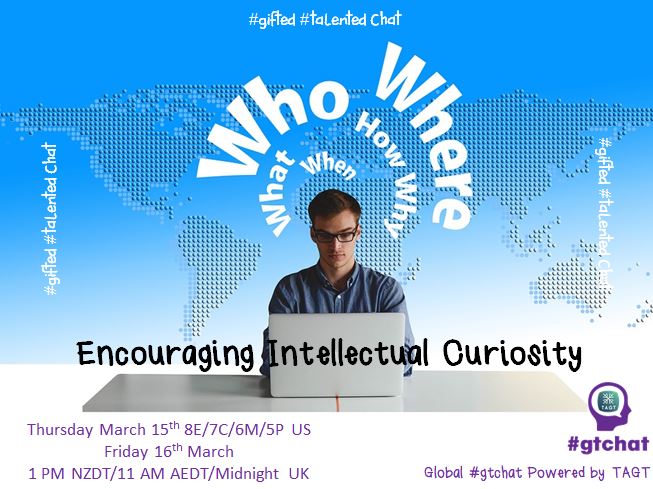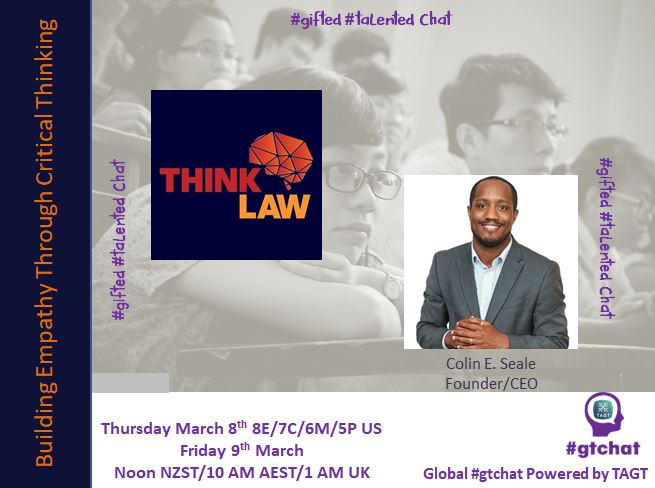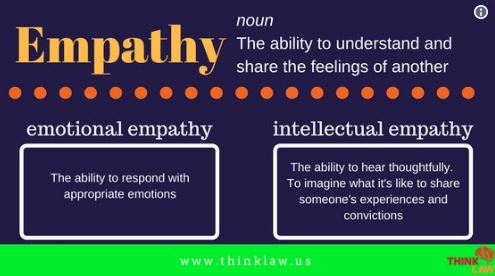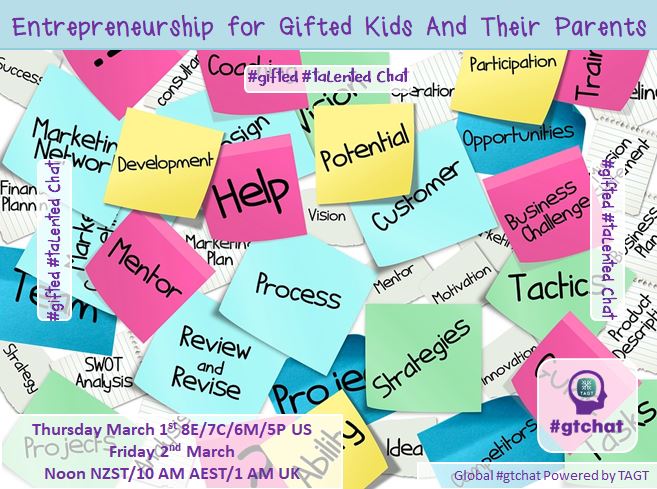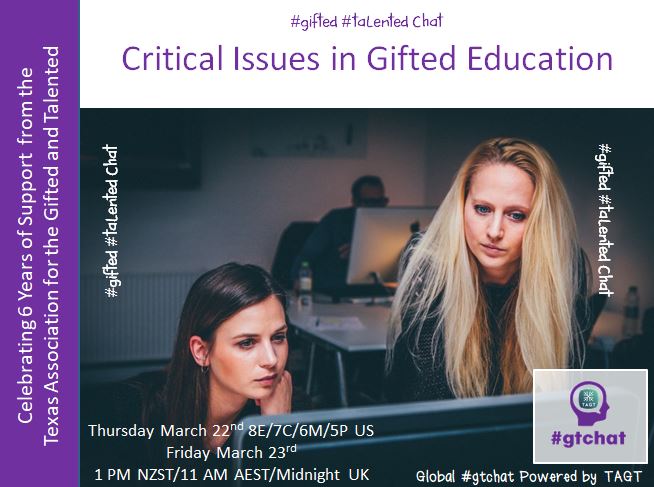
Before we began the chat, we thanked the Texas Association for the Gifted and Talented for 6 years of incredible support for #gtchat!
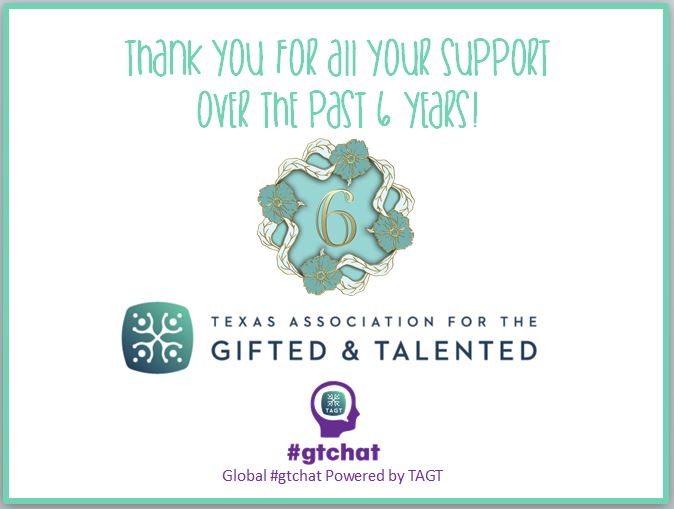
AND … Congratulated TAGT on their 40th Anniversary of serving the gifted and talented of Texas!
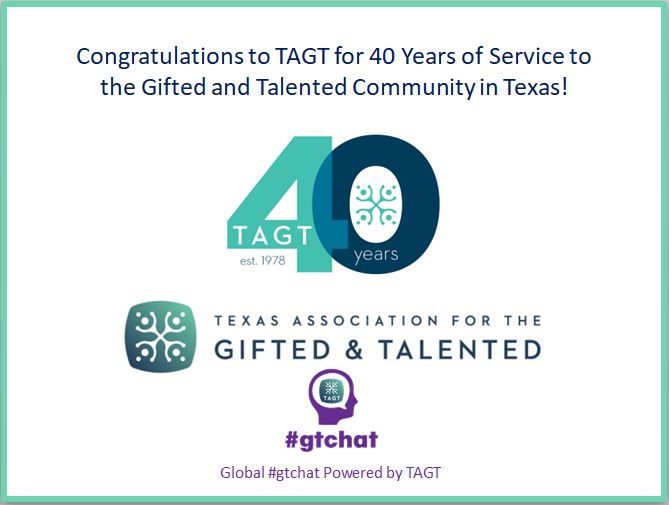
Today, there are many critical issues facing gifted education and this week at #gtchat we focused on six issues. These issues covered a wide-range including where the emphasis should be placed in educating gifted children – whole child or strictly academics; teacher certification; identification; funding; equity; and best practices.
Should teachers of gifted students be required to be certified in gifted education? Any profession benefits from certification. Gifted education is rarely covered at the undergraduate level. Educators often lack the knowledge to recognize giftedness or the know how to respond to gifted students. Certification enhances a teacher’s ability to fairly and competently provide the best possible education for gifted students.
There are ways of identifying students for participation in gifted programs that respect equity regarding race, gender, economic status, 2E, and more. Identification needs to be universally done in the early elementary years. If a child shows strong signs of giftedness, earlier assessment should be considered. Lack of challenge can lead to many behavior and academic issues later. Specific assessments that reduce bias are available and should be used when appropriate.
Gifted education has a place even in tight school budgets. Denying students services claiming there is no money is just an excuse. School districts always ‘find’ the money when they need to do so. All students deserve a free and appropriate education. Full stop. Gifted education does not have to be expensive. An open mind to its ‘appropriateness’ can lead to many low-cost interventions such as acceleration, genius hour, and PBL.
Should greater emphasis be placed on the whole gifted child or academic achievement? Gifted education should meet the unique needs of each individual student. High achievers are not necessarily gifted and vice versa. Gifted students have many needs beyond academics; dealing with myths about being gifted, bullying, social-emotional needs, and finding intellectual peers.
Many options for gifted programming can be considered best practice. It begins with acknowledging the need for gifted services, early assessment and intervention, and providing a long-term individualized plan. Differentiation and acceleration are widely accepted as exceptional gifted programming; however, they don’t provide for students who exhibit an increased rate of acquisition. This leads to GT students relegated to the back of the room reading.
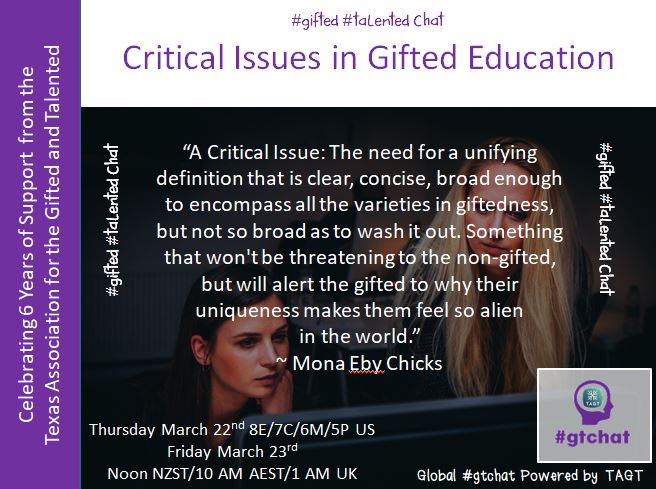
Why is it important to define what it means to be ‘gifted’? What are the consequences for failing to do so for educators, counselors and associated professionals? When teachers equate the ‘gifted’ label solely as high achievers, the gifted student will rarely receive appropriate intervention or adequate instruction and challenge in the classroom. Professionals who lack knowledge about what it means to be gifted cause a ripple effect throughout the system; such as referring students for inappropriate services, misdiagnosis of gifted characteristic traits, and misunderstanding 2E kids. A transcript of this chat may be found at Wakelet.

Global #gtchat Powered by the Texas Association for the Gifted and Talented is a weekly chat on Twitter. Join us Thursdays at 8E/7C/6M/5P in the U.S. and Fridays at 1 PM NZDT/11 AM AEDT/Midnight UK to discuss current topics in the gifted community and meet experts in the field. Transcripts of our weekly chats can be found at Storify. Our Facebook Page provides information on the chat and news and information regarding the gifted community. Also, checkout our Pinterest Page and Playlist on YouTube.
 About the author: Lisa Conrad is the Moderator of Global #gtchat Powered by TAGT and Social Media Manager of the Global #gtchat Community. She is a longtime advocate for gifted children and also blogs at Gifted Parenting Support. Lisa can be contacted at: gtchatmod@gmail.com
About the author: Lisa Conrad is the Moderator of Global #gtchat Powered by TAGT and Social Media Manager of the Global #gtchat Community. She is a longtime advocate for gifted children and also blogs at Gifted Parenting Support. Lisa can be contacted at: gtchatmod@gmail.com
Links:
Exploring Critical Issues in Gifted Education: A Case Studies Approach (Amazon)
Critical Issues and Practices in Gifted Education, 2E: What the Research Says (Amazon)
Overlooked Gems: A National Perspective on Low-Income Promising Learners (pdf)
Recognizing, Supporting and Nurturing Underserved Gifted Students: A Moral Imperative
The Interest Issues of Gifted Children (pdf)
Gifted and Talented Education: A Review of Relevant Literature (pdf)
State Report Card Shows Most States Struggle to Support High-Achieving Students with Financial Need
States Faulted on Help for High-Ability, Low-Income Students
County Aims to Break Down Racial Barriers to Gifted Classes
The Framework for Gifted Endorsement Guidelines – PA (pdf)
No, It’s not Time to Ditch the Gifted Label
Cybraryman’s Gifted Identification Page
I Did Something I would NEVER Do in Most Classrooms
Photo courtesy of Pixabay CC0 Public Domain
Image courtesy of Pixabay CC0 Public Domain
Graphics courtesy of Lisa Conrad.
